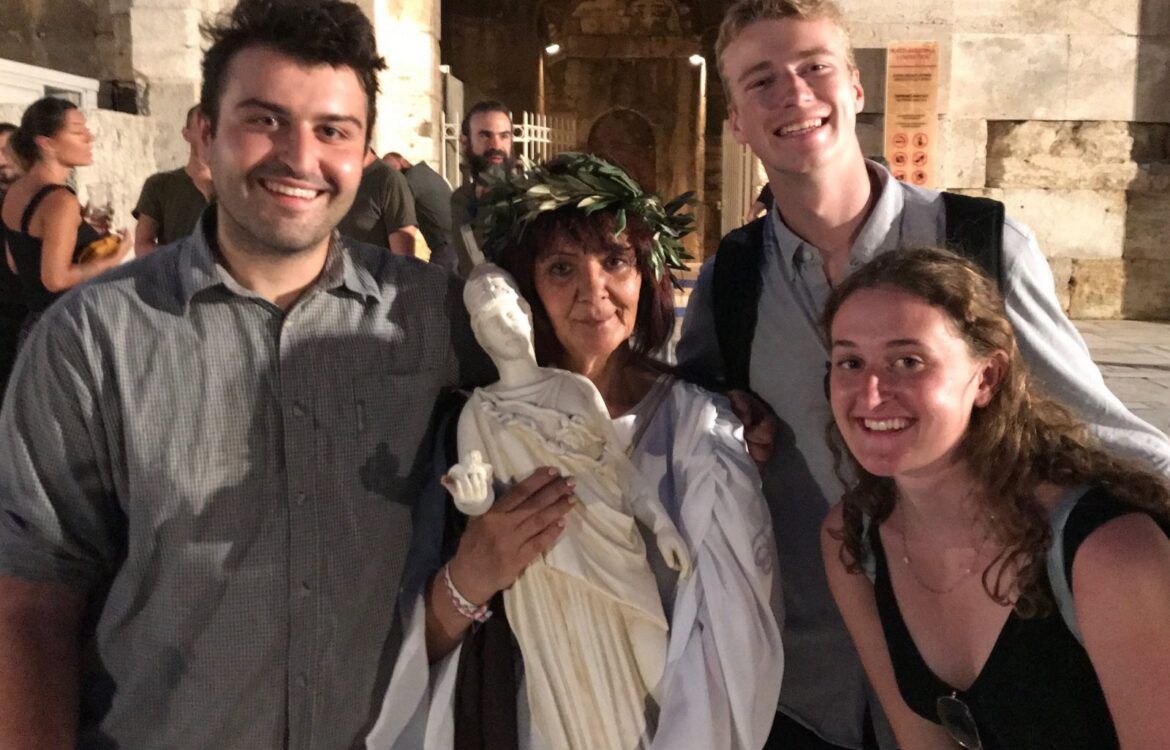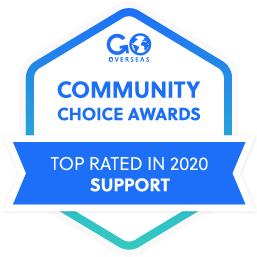
Interview with Caroline Barnes, CYA Alumna
Caroline Barnes, CYA alumna from summer ‘16 and spring ‘18, recently sat down with CYA for an interview about her multiple CYA experiences, her love for Greece, and the amazing work she’s been doing for refugees in Athens.
Q: Where are you from, what did you study, and when did you come to CYA?
A: I’m from Saratoga Springs, New York. I studied Anthropology and Classical studies at Bates College, a small liberal arts college in Maine. I’ve been to CYA twice officially—I took Professor Angelos Papadopoulos’ summer 2016 course, When Egypt meets the Aegean: Interconnections in the Bronze Age Eastern Mediterranean, and I really enjoyed it. I decided to come back to CYA for the spring semester in 2018.

Caroline with Professor Angelos Papadopoulos on site during summer 2016
Q: Were you planning to do the spring semester at CYA all along or did you decide to come again after you did the summer course?
A: In the summer of 2017, the year before I came CYA for the spring, my school’s study abroad advisor began to ask us where we wanted to go to study. Initially, I wasn’t thinking about coming back to CYA because I had already done the summer course in 2016. That summer (2017), I came to Delphi with the European Cultural Centre, and after that I knew I wanted to spend a semester in Greece. There is always something new and different to do here. And now I’m back in Athens again!
Q: What is there to gain from returning to the same place for study abroad rather than discovering new places?
A: For me, it was learning the language and the culture. When I first came to Greece, I didn’t speak any Greek at all. Even though many people here speak English, learning some Greek is very helpful and rewarding. The best thing I did when I came back to CYA was staying with a host family. They helped me learn a lot of Greek and it was great to experience how Greek people live in Athens.
Q: What was your experience like living with a host family?
A: I lived with a couple in Palaio Faliro. We’re still very close—I’ve spent two Easters with them, and I saw them when they visited New York recently. It can be intimidating, moving to a new city and living with family you don’t know, but they made be feel so welcome. It’s so nice to have a home away from home when you’re in a new country, away from your family. I got to experience Greek culture first hand. Living in a homestay was my favorite part of my semester.

Caroline with her host mom, Mima
Q: Great! What are you doing now in Greece?
A: I graduated from college in May and I knew that I didn’t want to go to graduate school immediately afterward, even though I know that want to get my PHD in the future. I’m not sure if I want to study archaeology or anthropology, so I needed some time to think. I also didn’t feel like I was ready to start working a full-time job.
Since I know that I want to work in this part of the world, and I’d really like to work on my Greek, I decided to come study here in Athens. I’m taking two social anthropology classes, one about Balkan identity and one about humanitarianism, at the Panteion University. I used one of my professor’s work in my thesis, so I reached out to her directly about studying with her at the Panteion. She gave me an invitation to study with her, which really helped with my visa.
The classes are catered to Erasmus students, so they’re in English and have a very international student body. There are also Greek students in the class, though. I’m also volunteering at the Agora and babysitting for a family while I’m here.
Q: How long will you be here?
A: My classes end in June, but I’m hoping to find something to do here until August, when my visa expires.
Q: What is it like taking classes here and learning the language? Are there any differences between your experience now that you know more Greek? Are you making more connections?
A: Yeah, definitely. I think that you make more connections knowing the language. I’m still quite nervous when I speak Greek because I’m scared that I’ll make mistakes, and sometimes I speak slowly because I need time to think. Everyone is so kind and they really appreciate that I’m trying, though.
Q: Do you think that you view things anthropologically sometimes because of your studies? Do you view the world around you as an anthropologist?
A: I think that I do. It’s funny, actually, because I’ve been joking with a friend at home that I’d like to do an ethnography of my class because it is a totally different environment than school in the United States.
I think that anthropology provides you with a way to engage with the world critically, even if you’re not actively trying to.
Q: I’m curious to see which field you decide to study. Do you think the two areas (Anthropology and Archaeology) have an intersection?
A: Definitely. The best thing about Anthropology is that you can apply it to anything. It helps me to think critically and to ask questions like, “Why do I see something in a certain way while someone else views it differently?” You can apply that same logic to the past and the study of antiquity. Anthropology helps you view the way we discuss history critically, and it helps you see the human aspect of objects that you may find as an archaeologist. It’s not about finding the right answers. Anthropology helps you find the right questions.
Q: I also wanted to ask you about your volunteer experience. Currently, Greece is at the center of a lot of important events. The country is receiving many refugees, and geographically, it’s located close to Turkey and Syria, two countries that are constantly in the news. In that same vein, I wanted to ask you about your experience volunteering with refugees in Athens and Lesvos.
A: The first time I ever came to Greece was in the summer of 2015. I came with my mom, who is a professor, because she was doing research at the University of the Aegean in Lesvos. My first night here was the night before the bailout referendum. It was a shock for me because I didn’t know anything about Greece’s political situation at the time. We were on Lesvos for a few weeks visiting a refugee camp, an experience that inspired me to work with refugees when I came back here to study with CYA. Being here during that turbulent time changed my outlook and my academic path.
Last summer, I volunteered at the NGO Faros with another CYA student teaching English and working with unaccompanied minors. That experience caused me to reflect, because it’s completely different to see something on the news than to experience it firsthand. Working with refugee children made me realize that kids just want to be kids, to play and feel safe. Everyone deserves that. It was difficult, at times, because the circumstances were tragic, but it was also hopeful, because I was able to connect with people on a personal level.
Q: Do you feel that, by volunteering, you broke a barrier that is set when people view the issue from far away, like on the news?
A: Yes. I saw the reality of it. On the news, you feel like it’s so far away from you, even being here in Athens as an American student. You know about it but you don’t see it daily, face-to-face. When you work with refugees personally, it strips away the political aspect and simply humanizes the situation. It’s not political when you’re doing it, you’re just helping people in need.
Q: How has CYA, helped you during your time here in Greece?
A: CYA has helped me tremendously. Everyone wants you to have the best experience possible, and they will do anything to help you make your dream a reality. I don’t think I would have had the experience in Athens that I did without CYA. I felt comfortable here and made so many connections through CYA, especially Nadia, who knows everyone. It can be hard at first, Athens is a big city and Greek is a difficult language, but CYA helped me integrate so much.
Q: Finally, what would you say to a student in the US who has been accepted to CYA and is waiting to come to Greece? Would you give any advice?
A: They should try to get involved in extracurricular activities around Athens. There is always something going on in the city. There are so many museums, events, concerts, and lectures in English. You can find a lot of things through Nadia or online. Pangrati is a great neighborhood, but it’s also good to get out and explore the city. Also—don’t be afraid to put yourself out there and meet new friends—you’re going to have an unforgettable semester!
You can read a blog post prepared by Caroline and Sandro about their volunteer experience here.





